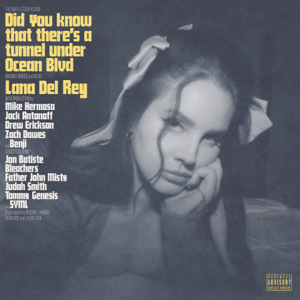Lana Del Rey released her ninth studio album Friday, March 24. An experimental and psychedelic inspired album, Did You Know That There’s a Tunnel Under Ocean Blvd? works to reveal her life experiences and their effect on her identity. In comparison to her other works, the album is strikingly quiet, and each song highlights Del Rey’s storytelling abilities.
Del Rey introduces the album with a song titled “The Grants,” alluding to her real name, Elizabeth Woolridge Grant. The intro is gospel-like, and a soft piano melody transitions into Del Rey singing about the beauty of her family and the lessons they taught her. The song is influenced by Del Rey’s perception of God and the legacy of loved ones who have passed, with lyrics such as “I’m gonna take mine of you with me.” This song is extremely poetic, similar to a lullaby with its kind rhythm and hymn-like vocals.
Throughout her album, Del Rey references how her family had a large influence on her current persona. Songs such as “Fingertips” and “Kintsugi” expose Del Rey’s experience with familial death. “Fingertips” addresses a trageic suicide of a family member “who hung himself real high.” Her high pitch singing mimics that of crying. In “Kintsugi,” the most retrospective song on the album, Del Rey describes the devastation of seeing a loved one pass away. Additionally, the song “Grandfather Please Stand on the Shoulders of My Father While He’s Deep Sea Fishing” details how the two father figures in her childhood influenced her “good in spirit, warm-bodied” character, countering the previous underlying messages about men in her life present in past albums.
Del Rey’s first reference of her mother and their estranged relationship is made in her hit release “A&W.” Released on February 14, “A&W” quickly became a huge success with over 1 million streams on Spotify. At 7 minutes and 13 seconds, “A&W” is definitely worth a listen. This song begins with a light, acoustic melody, but soon takes a dark turn, shifting to Del Rey’s trauma of sexual assault with the line “I mean look at my hair, look at the length of it and the shape of my body. If I told you that I was r—d do you really think that anybody would think I didn’t ask for it. I won’t testify, I already f—-d up my story.” These intensely heartbreaking lyrics demonstrate Del Rey’s extreme vulnerability within this album. While many of Del Rey’s previous songs surrounded the pain of heartbreak and obsession, this line of “A&W” is so raw and filled with feelings of a different kind of pain. Her struggles with sexual assault mirror that of many individuals, articulating such feelings by singing extremely quietly and almost stopping completely when referencing the word ‘r—-d.’
Additionally, Del Rey alludes to her older songs throughout the album, the most famous being in “Taco Truck X VB,” where she layers her 2018 song “Venice B—h” with a variety of beats and harmonies. For many, this was the one song on the album that gained approval.
Similarly, “Candy Necklace (feat. Jon Batiste)” and “Paris, Texas (feat. SYML)” have quickly grown in popularity, as their coquette elements resemble that of her earlier albums such as AKA Lizzy Grant and Born to Die. The chorus of “Candy Necklace” is extremely catchy, making mention of the hit soap opera “Young and Restless” and bringing up obsession in relationships once again, similar to that of her most notable work, Ultraviolence.
The song “Judah Smith Interlude,” on the other hand, is literally just a gospel reading with some piano in the background. It is 100% a skip, and it only works to unveil the experiences Del Rey had during childhood at an Episcopal school. This was not a fan favorite and definitely not worth listening to.
Though the quiet, lyric heavy songs caused many fans to write the album off as being too autobiographical, the album introduced a new side of Del Rey that revealed the artist’s personal life, while she is usually fairly reserved in her media presence. Overall, this album deserves a 4 out of 5 stars.





















